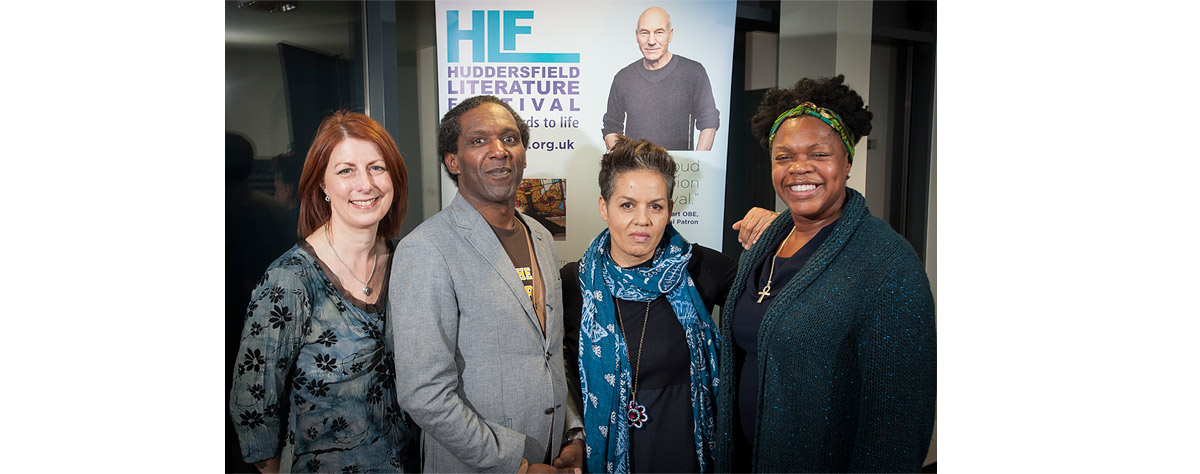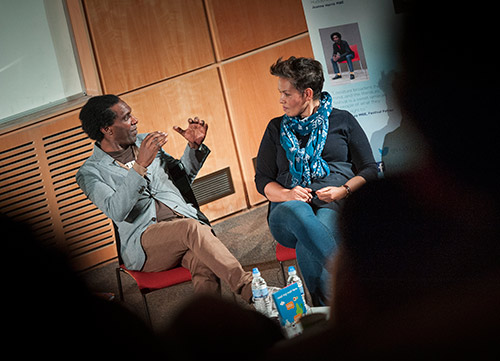Hudds LitFest – Writers voice their concern for children in care
 Pictured (left to right) are Huddersfield Literature Festival Director Michelle Hodgson, poet Lemn Sissay, award-winning author Kit de Waal and theatre director Amanda Huxtable.
Pictured (left to right) are Huddersfield Literature Festival Director Michelle Hodgson, poet Lemn Sissay, award-winning author Kit de Waal and theatre director Amanda Huxtable.
Wed, 15 Mar 2017 13:29:00 GMT
Leading poet Lemn Sissay and award-winning author Kit de Waal in conversation for the Huddersfield Literature Festival
 ON his visits to the University of Huddersfield, leading poet and activist Lemn Sissay has spoken powerfully and passionately about his upbringing in care homes and the problems and prejudices faced by children who are parted from parents and families. He returned to the topic when he shared a Huddersfield Literature Festival event with the author of a best-selling novel inspired by the same themes.
ON his visits to the University of Huddersfield, leading poet and activist Lemn Sissay has spoken powerfully and passionately about his upbringing in care homes and the problems and prejudices faced by children who are parted from parents and families. He returned to the topic when he shared a Huddersfield Literature Festival event with the author of a best-selling novel inspired by the same themes.
Birmingham-born Kit de Waal – who has worked in criminal and family law, served as a magistrate and sat on adoption panels – penned the multi-award-winning My Name is Leon. Set in the 1980s, it is the story of nine-year-old mixed race boy brought up in foster care but separated his baby brother, who is white and quickly adopted.
The HLF event took place at the University’s Diamond Jubilee Lecture Theatre. It was a discussion session led by theatre director Amanda Huxtable themed around the topic What happens to the children whose parents can’t look after them but no one adopts?
It provided the two writers with opportunities to explore the issues by drawing on their own experiences and observations, and Kit de Waal told of the dilemmas facing members of local authority panels who must decide on adoption and fostering.
Children who are aged above seven, or who are from an ethnic minority or have disabilities are much less likely to be sought by adoptive parents, she told the audience.
“They then have what I call foster care career. It becomes a series of moves and very few stay from seven to 18 with the same family,” said Ms de Waal, who also spoke about the emotional upheaval when siblings were separated.
 She described some of the techniques she adopted so that she could write My Name is Leon from the point of view of a nine-year-old boy – such as squatting in the aisles of a supermarket to see what the shelves looked like at four feet tall. She also researched and reconstructed the life and culture of the early 1980s
She described some of the techniques she adopted so that she could write My Name is Leon from the point of view of a nine-year-old boy – such as squatting in the aisles of a supermarket to see what the shelves looked like at four feet tall. She also researched and reconstructed the life and culture of the early 1980s
Lemn Sissay spoke about the nature of family, which he described as “a collection of disputed memories between one group of people over a lifetime - and I had no-one to dispute the memory of me.”
He also spoke about society’s prejudice against people brought up in care and the difficulties in setting them high aspirations.
“We tell our children to reach for the stars, but we don’t do that with children in care because we can’t imagine how they are going to do it.”
Both of the writers have sponsored university scholarships aimed at care leavers. Kit de Waal told how she used the proceeds of her highly-successful novel to fund MA scholarships in creative writing, and Lemn Sissay has backed a PhD scholarship in his name at the University of Huddersfield, where he holds an honorary degree.
His latest book in the collection is Gold from the Stone, which contains selected poems spanning 30 years.







